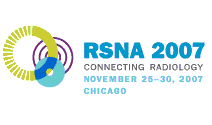
Abstract Archives of the RSNA, 2007
Colin Patrick Cantwell MD, Presenter: Nothing to Disclose
Kevin E. Taubman MD, Abstract Co-Author: Nothing to Disclose
Peter Nelson Waybill MD, Abstract Co-Author: Nothing to Disclose
Leslie Bernard Scorza, Abstract Co-Author: Nothing to Disclose
Harjit Singh MD, Abstract Co-Author: Nothing to Disclose
Frank C. Lynch MD, Abstract Co-Author: Nothing to Disclose
Evaluation of our clinical experience with the Bard Recovery filter as an optional inferior vena cava (IVC) filter .
497 patients had permanent or optional IVC filters placed over a 3 year period. 238 Bard Recovery filters were placed in 237 patients with a clinical indication for temporary caval filtration. 77 Bard Recovery filters were removed. Patients’ physicians were contacted at 6 and 12 months to ensure removal when clinically appropriate. Patients were followed prospectively for complications, filter efficacy and technical success of attempted retrieval.
The patient cohort consisted of 141 men and 96 women. Indications for filter placement included immobility after trauma (65%). No pulmonary embolus was clinically detected. Complications included one partial caval thrombosis, caudal and cephalic filter migration. Recovery filter removal was attempted in 32% at a mean of 173 days (range 0-549 days) after placement. The Recovery filter was successfully retrieved in all patients.
Retrievable filters can be used safely beyond the licensed implantation period. Our high filter retrieval rate was driven by a program of physician follow up.
Retrievable filters can be used safely beyond the licensed implantation period. Improved retrieval can be achieved by contact with the refering physician .
Cantwell, C,
Taubman, K,
Waybill, P,
Scorza, L,
Singh, H,
Lynch, F,
Retrievable Inferior Vena Cava Filters: Experience in 237 Patients. Radiological Society of North America 2007 Scientific Assembly and Annual Meeting, November 25 - November 30, 2007 ,Chicago IL.
http://archive.rsna.org/2007/5002890.html

